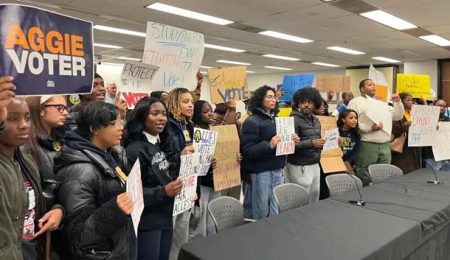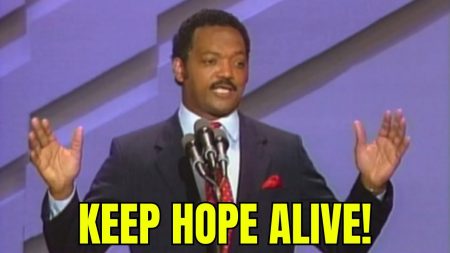Democrats Embrace Their Values

Convention Theme is “Americans Coming Together”
By Moe White
A generation after the late Jerry Falwell’s Moral Majority staked out “values voters” as a way to encourage conservative Democrats to support Republicans, the party of Roosevelt, Kennedy, and Clinton seems at last determined to reclaim the word and stake their claim to the actual values that made America great.
They focused on the United States, a single nation uniting a diverse community that relies on all its members to succeed and thrive. They showed that any weak link will destroy the chain, just as one person with untreated illness can infect the entire community. They recognize that all Americans working together for common prosperity makes us a stronger nation, while working selfishly for one’s own interests creates imbalances that will destroy our society.
First Lady Michelle Obama described the time when she and the president were just beginning to know each other.
“Barack and I were both raised by families who didn’t have much in the way of money or material possessions but who had given us something far more valuable – their unconditional love, their unflinching sacrifice, and the chance to go places they had never imagined for themselves. They believed … if you work hard and do what you’re supposed to do, then you should be able to build a decent life for yourself and an even better life for your kids and grandkids. That’s how they raised us.
“We learned about dignity and decency – that how hard you work matters more than how much you make … that helping others means more than just getting ahead yourself.”
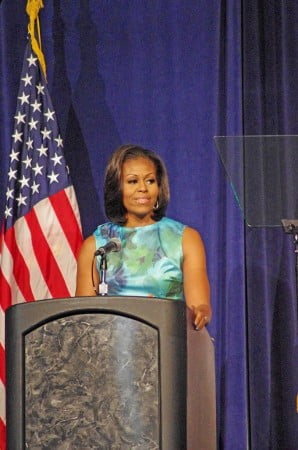
Sharing the Struggle, and the Benefits
“We learned about gratitude and humility – that so many people had a hand in our success, from the teachers who inspired us to the janitors who kept our school clean…and we were taught to value everyone’s contribution and treat everyone with respect.”
And, she said, they learned that, “When you’ve worked hard, and done well, and walked through that doorway of opportunity … you do not slam it shut behind you … you reach back, and you give other folks the same chances that helped you succeed.”
That awareness of a shared struggle, shared sacrifice, and shared achievements was also described by Lilly Ledbetter, who for nineteen years was paid less than men in her company who were doing the same work. When she finally learned of the pay discrepancy – which would also impact her Social Security benefits after she retired – she sued.
“We decided to fight for our family and to fight for your family too. We sought justice because equal pay for equal work is an American value. That fight took me ten years. It took me all the way to the Supreme Court. And, in a 5–4 decision, they stood on the side of those who shortchanged my pay, my overtime, and my retirement just because I am a woman.
“But,” she continued, “this fight became bigger than Lilly Ledbetter. Today, it’s about my daughter. It’s about my granddaughter. It’s about women and men. It’s about families. It’s about equality and justice.”
The first bill President Obama signed, nine days after taking office in January 2009, was the Lilly Ledbetter Fair Pay Act, passed by Congress specifically to overturn the Court’s misguided ruling. And, noted Ledbetter, “The president signed the bill for his grandmother, whose dreams hit the glass ceiling, and for his daughters, so that theirs never will. Because of his leadership, women who faced pay discrimination like I did will now get their day in court.”

A Helping Hand
Massachusetts Governor Deval Patrick noted, “We believe that we owe the next generation a better country than we found and that every American has a stake in that. We believe that in times like these we should turn to each other, not on each other. We believe that government has a role to play, not in solving every problem in everybody’s life but in helping people help themselves to the American dream.”
And Tammy Duckworth, an Iraq War veteran who lost both legs while piloting a helicopter there, discussed quite frankly how the American safety net works. Her father, a Viet Nam veteran, could not find work for a time after he and his Chinese-Thai wife returned with Tammy to the United States.
“Dad’s work took us all over the world until he lost his job. It was a tough time. We used up our savings, moved into a studio apartment. But our family did the responsible thing and rolled up our sleeves. Mom took in sewing.
“My 55-year-old dad tried to find work. But at 15, I was the only one with a job—after school, for minimum wage. Thank God for the food stamps, public education, and Pell grants that helped me finish high school and college,” she said.
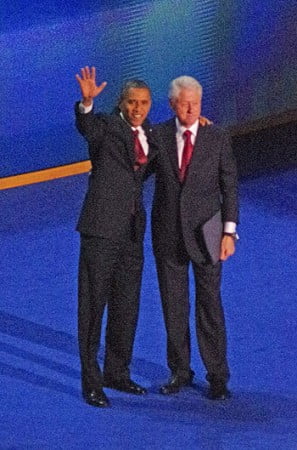
Diversity
Another core value proclaimed and demonstrated by the Democratic convention speakers is diversity. Twenty years ago newly elected President Bill Clinton talked of appointing a cabinet that “looks like America”; that was what America saw at the Democratic Convention in Charlotte at the beginning of September: America itself, in a mirror.
Delegates included hundreds of African Americans, Hispanics, Asians, and Pacific Islanders, as well as gay and lesbian representatives from every state. Delegations were also younger and more female than the “angry white guys” who, according to Republican Senator Lindsay Graham (SC), make up his party’s base.
As Wisconsin Senate candidate (and current House member) Tammy Baldwin put it, “Having a seat at the table matters, because no one checks their life experience at the door. They bring it inside with them, and it informs their votes as a member. The bottom line is, when you’re not at the table they’re talking about you; when you are at the table, they’re talking with you.”
A New Generation
The convention also showcased many of the next generation of leaders, those who hope to follow in President Obama’s footsteps to higher office. Among them were Newark Mayor Cory Booker, San Antonio, Texas Mayor Julian Castro, and Massachusetts Governor Deval Patrick.

All are well-educated, articulate, attractive politicians whose ideas reflect those of a generation for whom women’s equality is a given, support for reproductive rights and marriage equality are widespread, and accomplishment is not measured solely in terms of financial success but equally in making measureable contributions to society.
Cory Booker
Cory Booker became nationally famous this spring for two things: first, on April 13, the Newark mayor ran into a neighbor’s house and carried her out of a raging fire, earning him the media nickname “Superman”; six weeks later in a television interview, the popular Obama surrogate called attacks on Mitt Romney’s company, Bain Capital, by the president’s reelection campaign “nauseating,” remarks that were widely viewed as undercutting the president’s campaign message.
Booker, 43, attended Stanford University and Yale Law School, and was a Rhodes Scholar at Oxford. Like Barack Obama, he chose a career path very distant from the lucrative corporate options available to him.
While at Yale, he operated free legal clinics for low-income residents of New Haven and served as a Big Brother. After earning his law degree in 1997, he worked as staff attorney for the Urban Justice Center in New York and as program coordinator of the Newark Youth Project; he lived in Newark during his final year at Yale.
At the Charlotte convention, it was Booker who was chosen to introduce the platform for Obama’s reelection, and he offered a choice between policies that could enable America to “grow together as a nation or be a country of savage disparities that favor the fortunate few over the greatest driving force of any economy—a large and robust middle class.”
“We choose forward. We choose inclusion … We choose American economic might and muscle, standing strong on the bedrock of the American ideal: a strong, empowered, and ever-growing middle class.”
“We must invest in what will fuel us for generations to come. This is our history—from the Transcontinental Railroad to the Hoover Dam, to the dredging of our ports and building of our most historic bridges—our American ancestors prioritized growth and investment in our nation’s infrastructure … Today our businesses, industries, entrepreneurs and economy realize a return on those investments. Let us not fall prey to rhetoric that seeks to gut investment and starve our nation of critical, common-sense building for our future. And investment must include the real engine of job growth in America: the American small business.”
“The most critical investment we can make in a 21st-century, knowledge-based economy is education. Our president has already doubled Pell grants, raised education standards, invested in research and development at our universities and early childhood education in our neighborhoods … Our nation cannot continue to be the world’s number one economy if we aren’t committed to being the world’s number one educator.”
“You should be able to afford health care for your family. You should be able to retire with dignity and respect.
“And you should be able to give your children the kind of education that allows them to dream even bigger, go even farther and accomplish even more than you could ever imagine.
In this speech Cory Booker displayed the many qualities that appeal to voters and allies in the political world: eloquence, straight talk, and a willingness to include everyone in the vision he sets forth. Those characteristics alone make him a formidable player on the political scene.
Julian Castro
Born in Texas to a second-generation family, Julian Castro has been in love with the American dream since his childhood. He described his family’s journey this way.
“The American dream is not a sprint, or even a marathon, but a relay. Our families don’t always cross the finish line in the span of one generation. But each generation passes on to the next the fruits of their labor. My grandmother never owned a house. She cleaned other people’s houses so she could afford to rent her own. But she saw her daughter become the first in her family to graduate from college. And my mother fought hard for civil rights so that instead of a mop, I could hold this microphone.”
Castro was born in 1974, and like Booker he graduated from Stanford University before attending Harvard Law School. He applauds the opportunities that the United States offers, which have defined the American dream for generations.
“My family’s story isn’t special. What’s special is the America that makes our story possible. Ours is a nation like no other, a place where great journeys can be made in a single generation.”
Mayor Castro’s strongest affirmation is for the value of education. He and his brother were fortunate to be eligible for a scholarship to Stanford made possible, he says, “by affirmative action.” With college entrance scores below the median, he was accepted because of his potential – which he fulfilled without question.
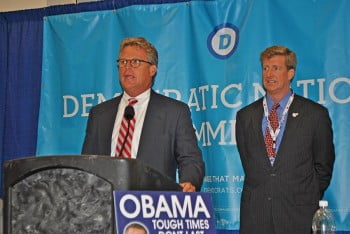
“In those classrooms,” he said, “[my brother and I] met some of the brightest folks in the world. But at the end of our days there, I couldn’t help but to think back to my classmates at Thomas Jefferson High School in San Antonio. They had the same talent, the same brains, the same dreams as the folks we sat with at Stanford and Harvard. I realized the difference wasn’t one of intelligence or drive. The difference was opportunity.”
As mayor he has worked to make that opportunity available to as many students as possible. “We’re working to ensure that more four-year-olds have access to pre-K. We opened Café College, where students get help with everything from test prep to financial aid paperwork.” And he explains its long-term value: “We know that pre-K and student loans aren’t charity. They’re a smart investment in a workforce that can fill and create the jobs of tomorrow. We’re investing in our young minds today to be competitive in the global economy tomorrow.”
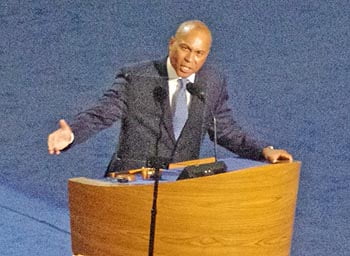
Gov. Deval Patrick
Deval Patrick is actually five years older than President Obama, but because he has never held federal elective office he is still perceived as a newcomer on the national stage. A graduate of Harvard (undergraduate and law), he served under Bill Clinton as Assistant Attorney General for the Civil Rights Division, and he worked in private practice before he ran for governor in 2006.
Patrick’s public image has been similar to Obama’s: a cool, cerebral, and dispassionate lawyer who focuses on getting things done rather than changing the world. But at the Democratic Convention, he spoke with passion and oratorical power.
“Good evening, Democrats!” he called out. “Are you fired up? Are you ready to go? I hope so.”
He continued, “This is the election of a lifetime. Because more than any one candidate or policy, what’s at stake is the American dream. That dream—the ability to imagine a better way for ourselves and our families and then reach for it—is central to who we are and what we stand for as a nation. Whether that dream endures for another generation depends on you and me. It depends on who leads us, too.”
Patrick outlined the values that guide his administration and the Democratic Party: “We believe in an economy that grows opportunity out to the middle class and the marginalized, not just up to the well connected. We believe that freedom means keeping government out of our most private affairs, including out of a woman’s decision whether to keep an unwanted pregnancy and everybody’s decision about whom to marry. We believe that we owe the next generation a better country than we found and that every American has a stake in that. ”
And in a rousing call to arms, he challenged his fellow Democrats to “stiffen our backbone and stand up for what we believe. Children [in need] are America’s children … and among them are the future scientists, entrepreneurs, teachers, artists, engineers, laborers and civic leaders we desperately need. For this country to rise, they must rise—and they and their cause must have a champion in the White House.”
Patrick spoke with unaccustomed passion before the convention; even commentators who have watched his career for years remarked that they had never seen him speak “like that.” Perhaps he is auditioning for the role of Obama’s successor, perhaps not; but it is a likely bet that he will have his hat in the ring for another office as he looks ahead to the end of his second term.
Castro, Booker, and Patrick are three men who enjoyed only a brief time – about five minutes each – in the spotlight at the Democrats’ national convention, but their speeches have been broadcast, rebroadcast, discussed, and analyzed by pundits in the days since. While none of them could be said to be “the chosen one,” all are well positioned to benefit from their status as up-and-coming leaders of their party, their states and cities, and perhaps their country.
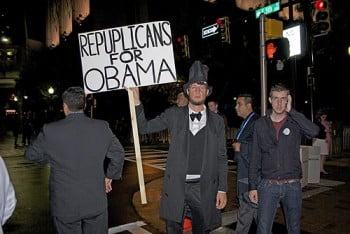
A Value-Laden Platform
Like its delegates, the Democrats’ platform is one of inclusion rather than exclusion, of a forward vision rather than a look through a rear-view mirror. It calls for strengthening Social Security, Medicare, Obamacare, and the rest of the social safety net rather than slicing it into tatters. It supports sound education programs and opportunities, such as keeping student loans affordable instead of turning them over to the same banks that helped sink the economy four years ago. It calls for a sensible defense budget, including cuts to unneeded and unwanted military programs and a greater emphasis on special operations rather than massive warfare.
The platform, like the newly energized Democratic Party itself, calls for a renewal of an America that has been demonized for 30 years – an America in which everyone has a chance, everyone contributes a fair share, and every little boy and girl can grow up with the dream and the possibility of becoming whatever they want in life. In that sense it is a profoundly conservative platform– and thus as radical in the possibilities it envisions for all its citizens as the founding fathers would want.



